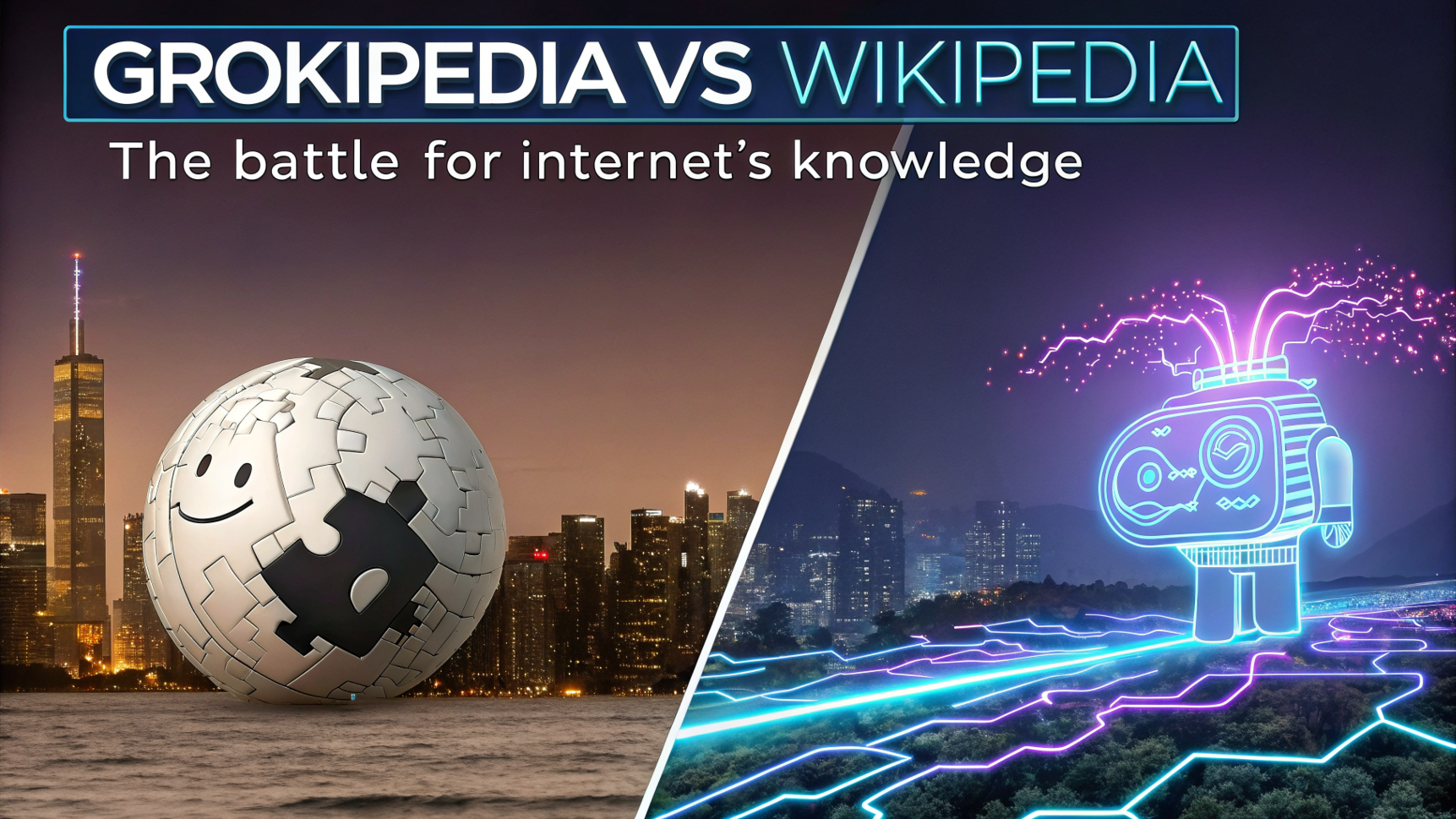“A comparison of two knowledge platforms: Grokipedia v0.1 vs Wikipedia”
The Big News: What Just Happened?
In a move that's sending shockwaves through the digital knowledge landscape, Elon Musk just launched Grokipedia - an artificial intelligence-powered encyclopedia that's positioning itself as a direct competitor to the world's most popular reference source, Wikipedia. But this isn't just another tech launch; it's the beginning of what could be the biggest battle for how we access and trust online information.
On Monday, October 28, 2025, Musk took to X (formerly Twitter) announcing: "https://grokipedia.com/ version 0.1 is now live. Version 1.0 will be 10X better, but even at 0.1 it's better than Wikipedia imo." Bold words from the billionaire entrepreneur, but what's really behind this ambitious project?


The Numbers Game: How Do They Compare?
Let's talk scale. When Grokipedia launched, it debuted with approximately 885,279 articles. That sounds impressive until you compare it to Wikipedia's massive library of 7.1 million articles in English alone. Wikipedia ranks as the 9th most-visited website globally, built over 24 years by millions of volunteer contributors.
But here's where it gets interesting: Musk has labeled this as "version 0.1," suggesting we're seeing just the tip of the iceberg. He's promising that version 1.0 will be "10X better," which could mean exponential growth in both article count and quality.
Launch Day Drama
The debut wasn't exactly smooth sailing. Within hours of going live, Grokipedia crashed due to overwhelming traffic - a testament to public interest but also a reminder that even Musk's ventures aren't immune to technical hiccups. The site returned later that evening, sporting a minimalist homepage with just a search bar and the title "Grokipedia v0.1."
Why Is Musk Doing This? The Controversy Explained
To understand Grokipedia, you need to understand Musk's long-standing beef with Wikipedia. The billionaire hasn't been shy about his criticism, calling Wikipedia "Wokipedia" and accusing it of harboring "far-left activists" who control content.
Musk's grievances aren't new. In October 2023, he famously offered to buy Wikipedia for $1 billion - on the condition they change their name to "Dickipedia." (Yes, really.) When that obviously didn't happen, he decided to build his own.
The "Propaganda" Problem
Just before launch, Musk delayed Grokipedia by a week, stating they needed "to do more work to purge out the propaganda." This delay reveals the fundamental challenge: if Grokipedia initially trained on Wikipedia and internet sources that Musk considers biased, how do you create something truly "neutral"?
David Sacks, a friend of Musk and the Trump administration's AI and crypto czar, amplified these concerns by calling Wikipedia "hopelessly biased," claiming "an army of left-wing activists maintain the bios and fight reasonable corrections."
What is Grokipedia?
Grokipedia is an AI-generated online encyclopedia developed by xAI and launched on October 27–28 2025.
- It claims over ~800,000 articles as of launch.
- It uses the Grok large-language model (LLM) to generate and edit content, rather than relying primarily on a volunteer human editor community.
- Musk frames the launch as a “truth-seeking” alternative to Wikipedia, seeking faster updates and less perceived bias.
- Early access has had hiccups: the site crashed briefly at launch, and observers found many articles that closely resemble Wikipedia pages or derive from them.
Highlights of Grokipedia
- AI-led content generation and fact-checking.
- Minimalist interface (search bar plus results).
- Non-editing model for most users so far (i.e., limited visible user edits compared to Wikipedia).
Limitations & concerns
- Many articles appear to be adapted almost verbatim from Wikipedia or contain identical wording, raising questions of originality and sourcing.
- Early articles reportedly show ideological slants, especially favoring right-leaning perspectives or Musk-friendly narratives.
- New platform: smaller scale, less mature editorial governance, risk of AI hallucinations or fact-errors.

What is Wikipedia?
Wikipedia is the crowd-sourced online encyclopedia maintained by the nonprofit Wikimedia Foundation since 2001.
- It hosts more than ~6 million English-language articles and many more in other languages.
- Content is created, edited and overseen by a global volunteer community; policies like Neutral Point of View, verifiability, no original research govern it.
- Because of its long history, wide adoption, transparency and citations to sources, it is widely considered a trusted knowledge base though not flawless.
Strengths of Wikipedia
- Massive breadth and depth of topics.
- Community moderation, visible edit history.
- Transparent sources and license (Creative Commons).
- Continuous refinement over decades.

Limitations & challenges
- Coverage may be uneven; some topics less well-represented.
- Volunteer model means speed of updates may lag breaking news or new research.
- Criticised by some (including Musk) for alleged ideological or editorial bias.
Head-to-Head Comparison: Grokipedia vs Wikipedia
| Feature | Grokipedia (v0.1) | Wikipedia |
|---|---|---|
| Creation & Editing Model | AI-model (Grok) generates and edits content; limited visible community editing so far. | Volunteer editors worldwide, open editing, visible logs and discussions. |
| Scale at Launch | ~800,000 articles (much smaller than Wikipedia) | Millions of articles across languages; English edition has ~8 million+ topics. |
| Speed & Updates | Designed for near-real-time updates using AI; emphasises agility. | Slower, as updates depend on human editors verifying, sourcing and discussing changes. |
| Bias & Editorial Control | Centralised under xAI and Musk’s vision; critics see ideological tilt in early entries. | Distributed editorial control; many policies to mitigate bias, though community acknowledges some systemic issues. |
| Sourcing & Transparency | Some articles note “adapted from Wikipedia”; many lack full edit transparency or robust citation trails yet. | Strong tracing of sources, edit history; each article must meet verifiability and neutral point of view standards. |
| Governance & Sustainability | For-profit model (xAI) currently; still very early stage (v0.1). | Non-profit Wikimedia Foundation; widely adopted and understood governance model. |
| Licensing & Re-use | Some content derived from Wikipedia under CC BY-SA; unclear wider licensing. | Creative Commons Attribution-ShareAlike license widely used. |
| Reliability & Maturity | New, experimental; risk of AI errors, bias, underlying model limitations. | Established, mature; still imperfect but long track record of improvement. |
Why Grokipedia Could Matter
- The idea of an AI-powered encyclopedia promises faster updates, especially for rapidly evolving topics (breaking news, emerging tech).
- It challenges the dominance of Wikipedia by offering an alternative model: fewer human bottlenecks, more automation.
- For users seeking a “single-source” reference that pulls from AI models in real time, Grokipedia may become a new option.
It reflects the broader trend of generative-AI tools entering every domain including how we consume and trust knowledge.
Key Risks & What to Watch
- Accuracy: AI models are prone to “hallucinations” (mistakes, fabrications). Some early Grokipedia entries already contain factual errors.
- Bias: If the model is trained or steered with certain ideological leanings, the encyclopedia may reflect those biases. Early analysis shows right-leaning framing in some entries.
- Transparency & edits: Without visible community editing and clear audit trails, trust may suffer. Wikipedia’s transparency is a key strength.
- Licensing/attribution issues: Some Grokipedia content appears to be near-verbatim from Wikipedia (though sometimes acknowledged); questions of reuse, attribution, and originality arise.
- Scalability and governance: Building millions of accurate, well-sourced articles with AI is a massive challenge. Can Grokipedia reach maturity and trustworthiness?
User adoption: Even if technically competent, will users (academics, professionals, students) trust an AI-first encyclopedia over the tried-and-true Wikipedia model?
What This Means for Users & Researchers
- When using Grokipedia: treat it as beta, with caution; cross-verify facts from other trusted sources.
- When using Wikipedia: still a strong option, but remember that “crowd” model isn’t perfect; check sources and talk pages for contentious topics.
- For educators, students or librarians: it may be a good moment to update information-literacy teaching: “How do we evaluate AI-generated knowledge vs volunteer-curated knowledge?”
- For the future of knowledge platforms: expect more hybrids, AI-driven + human oversight. The emergence of Grokipedia signals that dynamic.
Conclusion
The launch of Grokipedia marks a significant moment: an AI-driven attempt to challenge Wikipedia’s decades-old model. While Wikipedia remains the trusted, broad-based reference encyclopedia with millions of articles and a robust editorial community, Grokipedia offers a glimpse into what knowledge dissemination might look like in the age of generative AI — faster, more automated, but also riskier and less proven.
For now, Wikipedia remains the safer bet for most users. But Grokipedia is worth watching - if xAI can address accuracy, transparency and bias, it may become a meaningful alternative or complement. In the end, whether our collective knowledge base is built by volunteers or AI models, what matters most is trustworthiness, transparency, and accessibility.
Leave a comment
Your email address will not be published. Email is optional. Required fields are marked *










